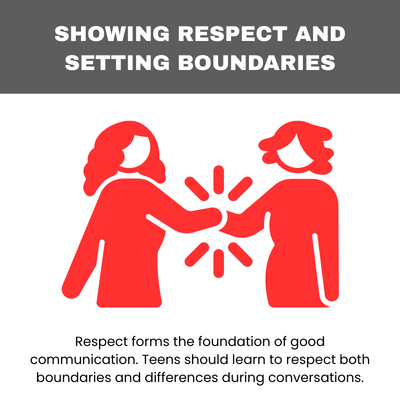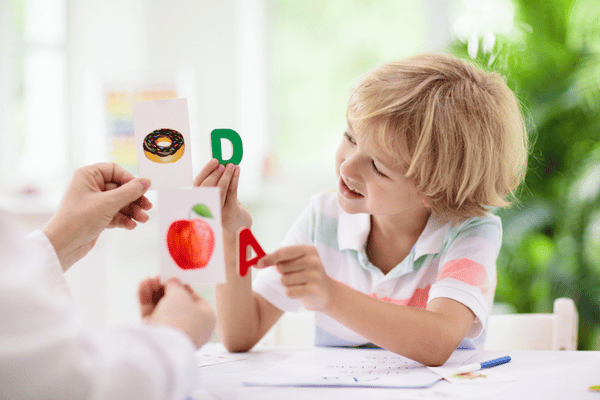

Teenagers today live in a world of constant communication through social media and texting. Yet many struggle with basic face-to-face interaction. When your teen gives one-word answers or seems nervous talking to others, it’s time to focus on building stronger conversation skills through debate and public speaking.
Good communication goes beyond polite manners. It forms the foundation for healthy relationships and personal growth, and expanding vocabulary supports clearer expression. Teens with strong friendships tend to have better mental health and higher self esteem than those who feel isolated.
Table of Contents
Why Communication Matters More Than Ever
The teenage years are when peer connections become central to identity development. Research shows that young people with solid relationships experience greater emotional well-being. Communication is the bridge that creates these important bonds.
Strong conversation skills also boost confidence and self-worth. A teen who can express themselves clearly feels heard and valued. Poor communication, on the other hand, can damage self esteem over time.
Modern Challenges Teens Face

Today’s teenagers face unique obstacles in developing conversation skills. Heavy reliance on digital communication means they miss crucial nonverbal cues like body language, facial expressions, and tone of voice.
When teens socialize primarily online, they lose practice reading emotions in real time. Messages get misinterpreted without vocal reactions and visual signals. After spending so much time behind screens, many teens find real conversations and public speaking intimidating.
The link between heavy social media use and teen mental health concerns is troubling. Studies show platforms like Instagram and TikTok are associated with increased depression, anxiety, and low self esteem.
Social anxiety often develops when teens avoid in-person communication. While avoidance provides short-term relief, it typically makes anxiety worse over time. The COVID-19 pandemic made this problem worse by limiting daily opportunities for casual conversation.
Some teens face additional challenges. Those with autism or social communication disorders may struggle with unwritten social rules. Teens with ADHD often interrupt or miss subtle social cues. Those with social anxiety feel extreme fear of judgment in conversations.
Essential Skills to Practice
Effective communication involves multiple elements working together. Teens need to master both what they say and how they say it.
Active Listening and Building Empathy
Good conversation starts with good listening skills. Teens should practice giving full attention when others speak. This means putting away phones, facing the speaker, and focusing on their words.
Active listening involves showing engagement through nods, follow-up questions, and reflecting back what you heard. For example: “So you felt left out when your friends went without you? That sounds really hard.”
Over half of good communication comes from listening well. Teach your teen to remember details and respond to them later. If a friend mentions an upcoming test, ask about it next time you talk.
Using Positive Body Language and Eye Contact

Much of what we communicate isn’t spoken. Posture, facial expressions, and eye contact send powerful messages. Help teens become aware of their nonverbal cues.
Encourage your teen to face conversation partners, keep an open posture, and make appropriate eye contact. A friendly smile and occasional nod put others at ease. Looking at phones or slouching signals disinterest.
Reading others’ body language is equally important. Are they stepping back or checking their watch? These nonverbal cues help teens adjust their approach in real time.
Speaking with Clear Voice and Appropriate Tone
How something is said matters as much as what is said. Teens should speak loudly enough to be heard without shouting. Clear articulation beats mumbling into hoodies.
Tone conveys emotions and intent. A calm, respectful tone helps during sensitive discussions. An eye-roll or sarcastic tone might offend unintentionally. Some teens speak so quietly that others struggle to engage with them.
Practice volume and expressive voice in safe settings. Teens should also learn when humor is appropriate and when it might hurt feelings.
Starting and Maintaining Conversations
Small talk might seem trivial, but it opens doors to deeper connections. Help your teen learn conversation starters for different situations. Simple comments about shared classes, genuine compliments, or questions about weekend plans work well.
Ice breakers like “How was your weekend?” or “I like your shirt!” help teens connect with new people. Topic maintenance means staying focused long enough to exchange meaningful ideas rather than jumping between subjects.
Taking turns talking and listening is fundamental to good conversation. If your teen dominates discussions or goes silent, coach them on finding balance.
Showing Respect and Setting Boundaries

Respect forms the foundation of good communication. Teens should learn to respect both boundaries and differences during conversations. This means avoiding overly personal questions unless they know someone well.
Basic courtesy includes not interrupting, not talking over others, and staying polite during disagreements. Empathy means seeing conversations from the other person’s perspective and acknowledging their emotions.
Self-awareness in communication helps teens notice their own body language, tone, and words. Are they respecting others’ viewpoints? Do they sound angry without realizing it?
Handling Disagreements and Strong Emotions
Not all conversations go smoothly, and that’s normal. Learning conflict resolution skills prepares teens for real-world relationships. When disagreements arise, focus on ideas rather than personal attacks.
“I” statements work better than blame. “I feel hurt when…” sounds less accusatory than “You always…” Staying calm and controlling emotions takes practice, especially for teens still developing emotional regulation.
Treat disagreements as problems to solve together, not battles to win. It’s perfectly fine to agree to disagree or take breaks when things get heated.
Assertiveness means standing up for yourself while respecting others’ perspectives. This balanced approach helps resolve issues without damaging relationships.
Developing Adaptability in Communication Styles
Different situations call for different communication approaches. Talking to teachers requires more formality than chatting with close friends. Skilled communicators adapt to context and audience.
Some people are more direct, others more sensitive. Different cultures have varying communication norms. By recognizing these differences, teens avoid misunderstandings.
When to Seek Professional Help

Most teens can improve their conversation skills with guidance and practice conversations at home. However, some need extra support from speech-language pathologists or social skills specialists.
Professional therapy focuses on social communication – the art of conversation. Therapists work on specific skills like noticing nonverbal cues, practicing conversation starters, and understanding humor and sarcasm.
The safe environment allows teens to make mistakes and receive constructive feedback without judgment. The teenage years are critical for communication development. Gains made now can lead to tremendous confidence and success in adulthood.
Moving Forward with Confidence
Helping teens improve their communication is a team effort requiring patience, practice, and support. Despite modern challenges from smartphones to pandemic effects, teens can absolutely master face-to-face conversation.
Focus on active listening, positive body language, clear and respectful speech, and the courage to engage with others. Young people who develop these skills form stronger friendships, handle conflicts maturely, and carry themselves with growing confidence.
Ready to help your teen become a confident communicator? Start with one conversation starter at dinner tonight and watch their confidence grow. If your teen needs additional support, consider reaching out to us who specialize in adolescent communication strategies. The investment in their conversation skills today will pay dividends throughout their entire life.





